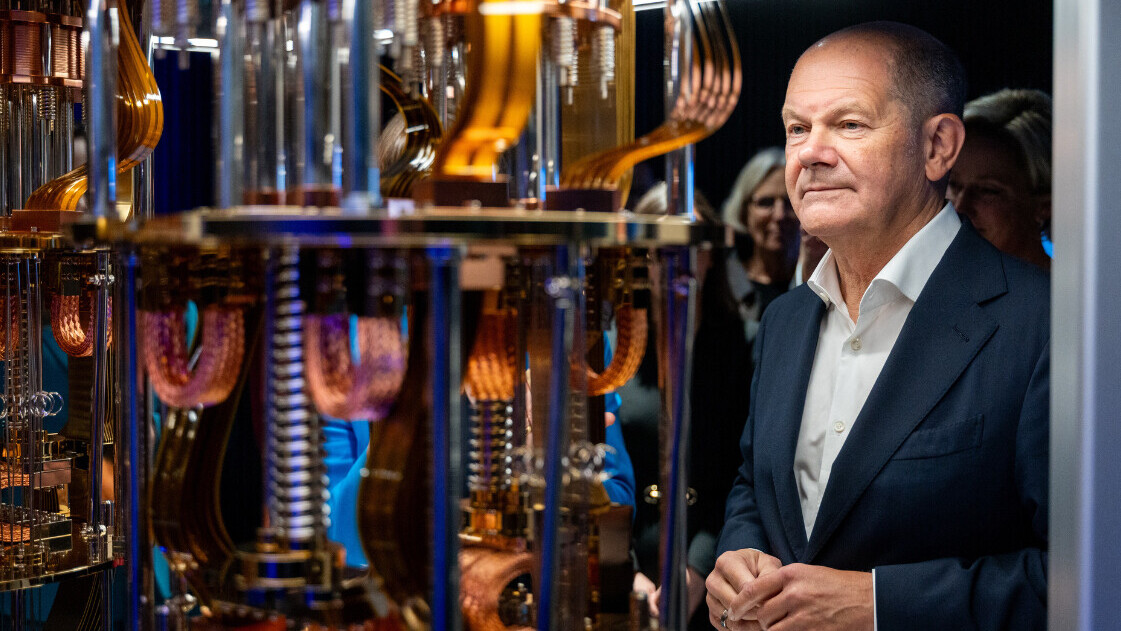
IBM’s first quantum data centre in Europe may have been planned during his predecessor’s tenure, but it was Olaf Scholz with entourage who descended on the small German town of Ehningen on Tuesday. The reason was to welcome the first IBM Heron processor to be installed outside of the US.
When the Chancellor of Germany shows up to spend nearly half a day at an event, you know it is a pretty big deal. Indeed, attracting projects like IBM’s new quantum data centre might be what makes or breaks German — and European — aspirations on “technological sovereignty” in the emerging area of quantum tech.
The tech giant’s most powerful quantum processor to date, Heron has 156 superconducting physical qubits. While IBM has achieved over 1,000 qubits on the Condor chip unveiled last December, when it comes to qubits, bigger is not always better.
“We did larger qubits to prove principles of scaling,” Jay Gambetta, VP of IBM Quantum, told TNW. “The key for the Heron is that now we are focusing on the quality of the gates.”
Quantum gates are basic building blocks of quantum circuits, used to manipulate and control the quantum states of the qubits. Their accuracy directly impacts the overall error rate of a quantum system. Along with solving the problem of reducing error rates, there is also the matter of how fast the circuits can run.
“Our R&D team here is 25 times faster at running circuits because we’ve improved the whole software stack,” Gambetta added. And software, he says, is where the key to pushing even “noisy” quantum machines into the era of utility — and business value — lies.
“There is this great surfacing of new codes in error correction. Using the old codes, people would say you’d need millions of qubits to do anything. But last year, we put out a paper that showed a new code that is 90% more efficient in numbers of qubits.”
Quantum computing, Gambetta said, will begin to have real impact when we discover the right algorithms. “And that means enabling startups, students, companies to do that type of work that’s only just starting now.”
Enabling quantum startup and ecosystem collaboration
In its algorithmic quest, IBM collaborates not only with universities but also with a number of startups. One of them is Finland’s Algorithmiq, which develops algorithms to integrate quantum computing with classical computing to advance chemistry and life sciences, in particular drug discovery.
To accomplish this, it needs algorithms — and scale, says the company’s founder Sabrina Maniscalco, which is why it has partnered with IBM. The startup’s error mitigation algorithm, TEM, is available through the Qiskit (IBM’s open-source software development tool) Functions Catalog.
“Now, with more IBM quantum systems available in Europe, we’re excited to further strengthen our ties in Europe and partner with an even larger ecosystem of industries, organisations, developers, and scientists to demonstrate TEM’s utility — and progress toward quantum advantage,” Maniscalco said.
Other startups currently partnering with IBM are quantum infrastructure software company Q-CTRL from Australia, and quantum operating system developers QEDMA from Israel.
While there may be a universal fault-tolerant system in the future, Gambetta is certain that the utility and business cases for quantum lie in hybrid systems, where quantum computations will run as a very important subroutine. Next year, IBM is installing a quantum computer right next to the Japanese supercomputer Fugaku.
‘Building a new industry’ and contributing to European quantum capabilities
That it was Germany and Ehningen that became the chosen location for IBM’s first Heron outside the US is hardly a coincidence. The company has deep connections to the small town in Baden-Württemberg, and the support from both local and federal governments has been instrumental in deepening the tech giant’s commitment to the region.
In addition, IBM is looking to position itself as a key player in the growing European quantum ecosystem.
“We are building a new industry,” said Dario Gil, IBM senior vice president and director of research. “Bringing the highest-performing quantum processor that we’ve ever built here is a commitment to bring the state of the art of the technology to Germany and to Europe.”
“The European Commission has defined quantum as one of the four key technologies for Europe to have capabilities on,” said Ana Paula Assis, chairman and general manager of IBM Europe, Middle East, and Africa. “And what we are doing here, bringing this first [quantum] data center outside of the US to the region, is a testament of our belief that we can contribute significantly to that progress.”
It also helps that plenty of the company’s prospective quantum solutions clients, for whom the technology can solve complex optimisation problems, are located nearby, such as SAP, E.ON, T-Systems, Bosch, and VW. IBM also has close ties with local research institutions, including Fraunhofer.
Get the TNW newsletter
Get the most important tech news in your inbox each week.





